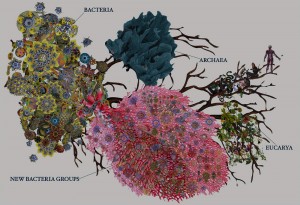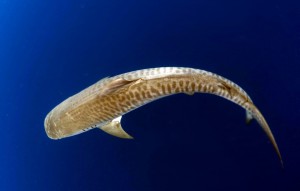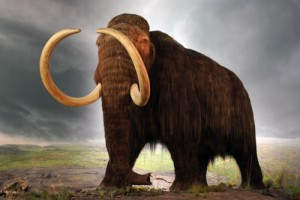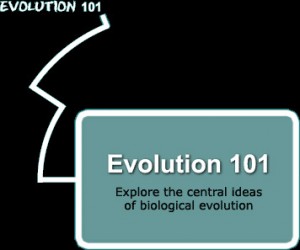by Richard William Nelson | Sep 3, 2015
 A new and unanticipated evolution dilemma now follows the wake of a massive new microbe discovery. Using a new technique, the number of known bacteria has been “bolstered by almost 50 percent,” according to a new article by Kevin Hartnett published in QuantaMagazine.org and reprinted in ScientificAmerican.com.
A new and unanticipated evolution dilemma now follows the wake of a massive new microbe discovery. Using a new technique, the number of known bacteria has been “bolstered by almost 50 percent,” according to a new article by Kevin Hartnett published in QuantaMagazine.org and reprinted in ScientificAmerican.com.
With a series of successively smaller porous filters, the University of California Banfield Group at Berkeley discovered a massive number of tiny “bacteria representing > 35 phyla… that consistently distinguished these organisms from other bacteria.”
Continue Reading
by Richard William Nelson | Aug 5, 2015
 Sharks get a bad rap. With only a cartilaginous skeleton, sharks were once thought to be the primitive evolution forerunner of the fish originating more than 400 million years ago during the Paleozoic Era―yet somehow surviving unchanged.
Sharks get a bad rap. With only a cartilaginous skeleton, sharks were once thought to be the primitive evolution forerunner of the fish originating more than 400 million years ago during the Paleozoic Era―yet somehow surviving unchanged.
Sharks suffer as a stereotypical indiscriminate evolution forerunner, surviving only to kill with unintelligent, deadly instincts. However, a new study on the migratory patterns of the tiger shark, Galeocerdo cuvier, published in the journal Nature, dispels these misconceptions.
Continue Reading
by Richard William Nelson | Jul 9, 2015
 The Influenza virus (pictured) is one of the best-known and studied pathogens in the healthcare industry. Infectious outbreaks of the virus, more commonly known as the flu, are legendary.
The Influenza virus (pictured) is one of the best-known and studied pathogens in the healthcare industry. Infectious outbreaks of the virus, more commonly known as the flu, are legendary.
The 1918 flu pandemic, also known as the Spanish flu, is estimated to have infected approximately 500 million people, ultimately resulting in the deaths of 50 to 100 million. The first influenza vaccine was approved for military use in 1945. Evolutionary scientists, however, continue to be increasingly perplexed by the unpredictable Influenza virus.
Continue Reading
by Richard William Nelson | Jun 11, 2015
 De-extinction is thought to have first appeared, as a word, in The Source of Magic (1979), a science fiction book by Piers Anthony, and caught the attention of Hollywood.
De-extinction is thought to have first appeared, as a word, in The Source of Magic (1979), a science fiction book by Piers Anthony, and caught the attention of Hollywood.
Using ancient cloned dinosaur DNA, popular ER television scriptwriter Michael Crichton then captivated the imagination of American film producer Steven Spielberg with the 1990 novel Jurassic Park, igniting the de-extinction craze.
In 2013, de-extinction was announced to be a science, at least according to journalist Ben Macintyre writing in the Times (London, March 8).
Continue Reading
by Richard William Nelson | May 14, 2015
 The Evolution 101 Common Ancestor website, produced by the University of California, argues that “the central idea of biological evolution is that all life on Earth shares a common ancestor.”
The Evolution 101 Common Ancestor website, produced by the University of California, argues that “the central idea of biological evolution is that all life on Earth shares a common ancestor.”
This idea dates back to Charles Darwin’s grandfather, Erasmus Darwin (1731-1802). He proposed that “all warm-blooded animals have arisen from one living filament,” which is a common ancestor.
In their book Tree Thinking (2013), David Baum of the University of Wisconsin, along with Stacy Smith of the University of Colorado, attempts to build on this Darwinian argument. “This means,” they argue, “that evidence of common ancestry is also evidence for evolution.”
Continue Reading
 A new and unanticipated evolution dilemma now follows the wake of a massive new microbe discovery. Using a new technique, the number of known bacteria has been “bolstered by almost 50 percent,” according to a new article by Kevin Hartnett published in QuantaMagazine.org and reprinted in ScientificAmerican.com.
A new and unanticipated evolution dilemma now follows the wake of a massive new microbe discovery. Using a new technique, the number of known bacteria has been “bolstered by almost 50 percent,” according to a new article by Kevin Hartnett published in QuantaMagazine.org and reprinted in ScientificAmerican.com.




